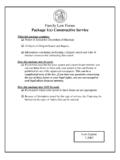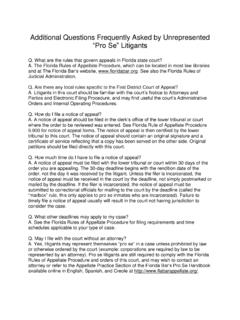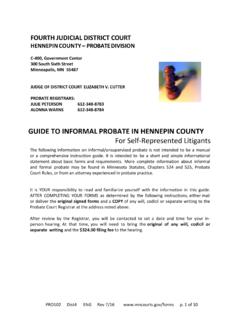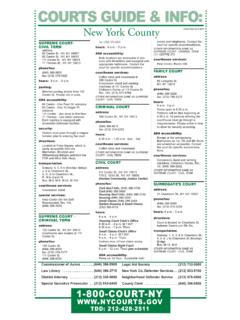Transcription of Notes to assist Self-Represented Parties in Financial ...
1 1 Liverpool Family Proceedings Court and Liverpool County Court March 2013 Further copies of these Notes are available from: Notes to assist Self-Represented Parties in Financial Remedies Hearings 2 Financial Remedies Hearings A guide for self represented Litigants Contents Purpose of this guide 2 Consent Orders 3 Mediation 4 Commencing proceedings 4 Pensions 5 Form E 6 Questionnaires 7 The First Appointment ( FDA ) 8 Financial Dispute Resolution Hearing ( FDR ) 9 Final Hearing 11 Purpose of this guide This guide is intended to give practical assistance to self represented Parties who are Parties to proceedings for Financial remedies arising from the breakdown of a marriage or civil partnership. The guide is intended to explain the procedure for claims for Financial remedies and what you should do to comply with the rules of court, 3 contained in Part 9 of the Family Proceedings Rules 2010 ( FPR ) which govern such applications.
2 The guide is not intended to give any advice on the merits of a claim or what the likely outcome will be. Nor is it the responsibility of the Court staff to give such advice. A self represented Party ( SRP ) may obtain legal advice at any stage of the proceedings and in cases where the Parties have substantial assets or income a SRP would be well advised to have legal advice. Even in cases in which the assets are less and the income is lower, some legal advice as to your entitlement and the likely outcome of the case would be beneficial even if you cannot afford to be represented at the court hearings. Consent Orders You can reach an agreement to resolve all Financial matters at any stage even before you commence a claim for Financial relief However such agreements are not binding unless they are approved by the court, and you are strongly urged to obtain legal advice on the wording of the proposed consent order before it sent to the court.
3 It is not the responsibility of either the Court staff or a judge to draft the order. 4 If you do reach agreement you should send two copies of the agreement one of which must be signed by both of you and a Statement of Information on Form D81. The documents will be reviewed by a District Judge who may order that there be a short hearing to make sure that both Parties understand the terms of the order and that the proposals are fair applying the criteria of S25 of the Matrimonial Causes Act 1973 Mediation If you have not reached agreement with your former spouse or partner then under a Pre-Application Protocol you are obliged to seek to resolve matters by mediation before you commence proceedings and if you refuse to do so you may be penalised in costs at a later stage. You must file Form FM 1 explaining what has happened to the mediation if you decide to commence proceedings Commencing proceedings Claims for Financial remedies usually have to be brought in the County Court in which proceedings to obtain a divorce or dissolution of a civil partnership have been issued.
4 5 The proceedings have to be commenced on Form A on which you have set out the types of order you are seeking. The most common are: Periodical payments for yourself Transfer of property, such as the former matrimonial home, or other assets including insurance policies and investments A pension sharing order This list is not exhaustive and if in doubt you should seek legal advice as to what orders you should be seeking. Child maintenance is usually dealt with by the Child Support Agency. A fee is payable when Form A is lodged with Court. If you are in receipt of State Benefits you may be eligible for fees remission provided you complete the appropriate form and also supply the Financial information referred to in it. Once the Claim has been issued, the Court will fix a date for the First Directions Hearing ( FDA ) which must be between 12 and 16 weeks from the date of issue.
5 The Court will usually serve Form A on your former spouse or partner Pensions If you are entitled to an occupational pension or have made your own pension provision you must, as soon as you issue proceedings ask each 6 pension provider for a CETV a statement as to the current transfer value of each pension Pension providers can take some time to produce this information so it important that you request it as soon as possible Form E This is the document that contains all your Financial information. It is very important that it is completed both accurately and on time. It must be sent to the Court and your former spouse or partner or their solicitor at least five weeks before the FDA. Form E should contain full details of your income including earnings investment income and all state benefits that you receive It should contain details of the former matrimonial home or other property that you own, either in your own name or jointly, including your estimate of the current value of each property and the amount of the outstanding mortgage on each property You must include full details of all bank and building society accounts whether in joint names or your own name and the current balance for each account.
6 7 Similarly you should include details of assets including insurance policies with their surrender values, stocks and shares and investment such as Tessa's and Isas. You must disclose full details of all credit cards including current balances and all loans or debts. You must disclose the current transfer value known as CETV for each pension Form E also makes provision for you to set out your current monthly expenditure for yourself and any dependent children and whether there will be any change in your expenditure. You must attach to Form E copies of statements for your bank and building society and credit card accounts for the 12 months up to the date you complete Form E. you must also attach the CETV of any pension and letters or other documents verifying your income and the amounts outstanding on any loans.
7 It obviously takes finance houses several weeks to supply copies of these documents. You should therefore apply for them as soon as possible so that you can send Form E to the court and your opponent 5 weeks before the FDA Questionnaires 8 Once you receive your opponents Form E you can, if you think it necessary, ask questions about it e. g to find out the purpose for significant payments out of an account or to ask why certain information has not been disclosed. The First Appointment ( FDA ) This is a procedural hearing usually conducted by a District Judge. Its purpose is to find out whether the Parties have disclosed all relevant information and to ascertain what else needs to be done before the claim is capable of being resolved either by negotiation or failing that judicial input. If party has not disclosed a properly completed Form E the hearing will have to adjourned and the party in default may be ordered to pay the costs which have been wasted by the adjournment.
8 The District Judge will decide whether any outstanding questionnaires need answering and set a timetable for the answers. Conversely the District Judge will strike out any unnecessary questions. If the Parties cannot agree the value of any substantial asset for example the former matrimonial home the District Judge will order a valuation with both Parties usually paying half the cost. 9 The District Judge will consider what other information, if any, is required before the claim can proceed to resolution either at or before the next procedural step. This is called the Financial Dispute Resolution Hearing ( FDR ) and is usually six to eight weeks after the FDA. The District Judge will order one of the Parties , usually the Applicant, to file a bundle of documents with the court for the FDR.
9 The bundle should contain: Copies of Forms E A schedule of assets stating which are agreed and which are not Both Parties open proposals for settlement. Evidence of a party s ability to pay a mortgage and examples of suitable housing, if rehousing is an issue Details of costs incurred to date Financial Dispute Resolution Hearing ( FDR ) The purpose of this hearing is to give sufficient guidance to the Parties as to the likely outcome if the case were to proceed to a Final Hearing so they can reach agreement and avoid the costs of a Final Hearing. It is important that all the directions given at the First Appointment have been complied with and the Court has been given the bundle of documents referred to above so that the District Judge hearing the FDR will have all the necessary information to give the Parties proper guidance.
10 10 The District Judge hearing the FDR will play no further part in the proceedings, if the case does not settle at that stage, and the Parties are free to make concessions on a without prejudice basis which are not binding if the case does not settle. In other words you are strongly encouraged to settle at this stage to avoid the costs and stress of a final hearing The District Judge will give a clear indication as to the likely outcome firstly on major issues such as: What are the housing needs first of the children of the marriage and also the Parties ? Should the former matrimonial home be sold? Should there be a pension sharing order? Should there be maintenance for one of the Parties or should that party s share of the assets be increased in return for a clean break?






